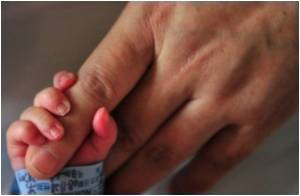
The babies' heart rates slowed at a greater rate when they heard the melody they had heard in the womb, compared to one they had not heard before, reports the Daily Mail.
The findings add to the understanding of the effects of what sounds are heard in the womb, including how babies learn to perceive speech.
Psychobiologist Carolyn Granier-Deferre of Paris Descartes University and her colleagues asked 50 pregnant women to listen to a descending piano melody twice daily.
When the 50 babies were one month old, both the descending melody and an ascending nine-note piano melody were played to the infants while they slept.
On average, the heart rates of the sleeping babies briefly slowed by 12 beats a minute with the familiar descending melody, compared to five or six beats with the unfamiliar melody.
Advertisement
Human hearing develops during the last three months of pregnancy. By five weeks before birth, the cochlea - the spiral-shaped part of the inner ear responsible for hearing - is usually mature.
Advertisement
Granier-Deferre added the findings do not mean pregnant women should play music to their developing offspring.
"When foetuses are old enough to hear fairly well, about four to five weeks before birth, they will be exposed to all the sounds of the maternal environment," she said.
"There is no biological need for more auditory stimulation - more is not always better, especially during development," she added.
The study has been published online in journal PLoS ONE.
Source-ANI









